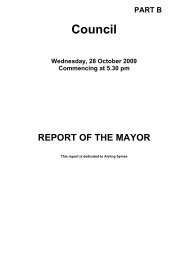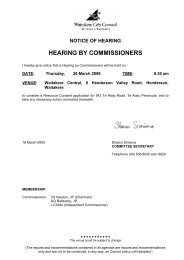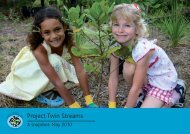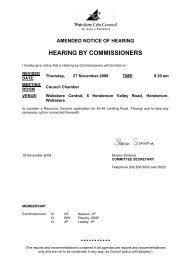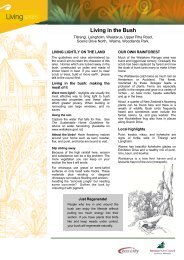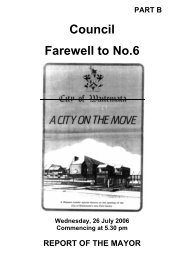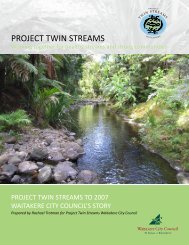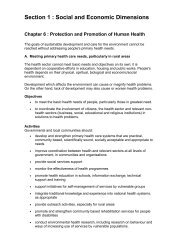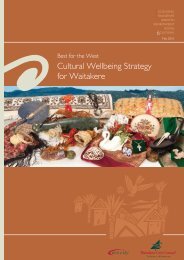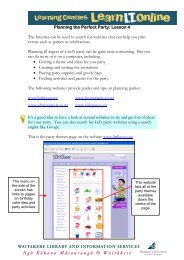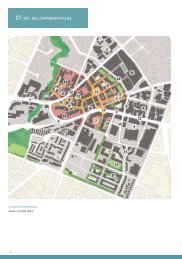The Waitakere Way - Looking Back, Going Forward - Auckland Council
The Waitakere Way - Looking Back, Going Forward - Auckland Council
The Waitakere Way - Looking Back, Going Forward - Auckland Council
Create successful ePaper yourself
Turn your PDF publications into a flip-book with our unique Google optimized e-Paper software.
PAGE 26Restructuring and the struggles of the early 90s‘That’s another era that’s got me again. <strong>The</strong> re-structuring of the early 90s really dismantled alot of things that were progressing’.‘Re-structuring was rampant. Redundancies were all over the place. How did that happen?Nobody will answer to that. In 1990, we had a ‘collaboration forum’, or consortium. We werealmost there. We just about had it. We had 100 people at that meeting, agreement amongstall the agencies that this was what we wanted. We were putting together proposals to go backto government agency headquarters and all sorts of things, and then re-structuring started.Half the people that were at the meeting, just disappeared. <strong>The</strong>ir jobs went..disappeared.None of [what’s happening now] is new. All of this has been the model in development atvarious points. It’s just been historical ups and downs. What seems to me to be the significantlearning from all that, is that out West, we managed to keep the vestiges of the model goingthrough the 90s’.‘All the consequent re-structuring - public financing – which basically put governmentdepartments into strict output criteria. Social Welfare, social work got into narrow boundariesabout outputs. <strong>The</strong> community funding side got shaved off. Wadcoss did fund some aspectsof Waipareira and so on but the consortium aspect was blown apart because you hadconstant re-structuring.. <strong>The</strong> whole environment was set against it. It became more difficult toget forums together with a norm because people realized that at the end of the day they werein competition…. …Progressively it became a boundary ride, arguing with Health about whowould pay for what, and all that sort of rubbish. <strong>The</strong>re was a lot of downtime and arguing whowas meant to do what… And of course having personnel and so on being selected to do onejob and then expected to do quite a different job with different skill sets’.‘It made people focus on small parts instead of the whole. Like.. the Social Worker peoplewould go into a house, we could only deal with the feet! – when you could see that it was partof a whole. So for me that was a fundamental flaw of carving everything up into little bits, andfunding just that. And you don’t have time to have the ‘cup of tea’ in which you hear the otherbits that are the crucial bits. So, I mean, you’re counting the time you open the door, ratherthan the quality.’<strong>The</strong> nasty 90s: everyone for themselves?‘A while back there was a right-wing thrust where everyone was in competition with eachother, the business model. And that was a very unhealthy time in the Community – jealouslyguarded funding pockets and fighting between Social Services about who was getting what asfar as money was concerned. And even though that’s still there today, I think that there’ssome key players in <strong>Waitakere</strong> that get beyond that competitive model. It’s actually thecompetitive model versus the collaborative model, isn’t it? I remember my own internalstruggle with fighting to get money and then thinking ‘Hey, we’re all in this together’. And, like,should I just try to make sure that [we] are well provided for, but..what about them down theroad? Like, it really stretched me, as well, to think beyond the things that I was managing. Allthat I can think is that we were thinking about the greater picture and looking at the widerneeds of the community, not just their particular sector, or their particular group or iwi’.Politics between and within sectors‘One of the best things was the Health Forum – the day it folded was a HUGE disgrace. It didso much good. It was like the grassroots got a chance to talk and be heard. It was reallyinclusive and found money for Maori/PI to do their own things in their own ways eg. PI set upa fono and hui were held on marae”‘Plunket and public health nurse roles in the community were pivotal – especially with at riskfamilies and young children. Public health nurses (phns) used to take more of a big picturerole then and were in the homes more. <strong>The</strong>re was some rivalry between plunket nurses andand phns….they couldn’t see for awhile that they were working for the same end product(healthy kids and families). It’s really sad that the PHN role has changed – there’s noacknowledgement anymore that you need hand holders in communities”



